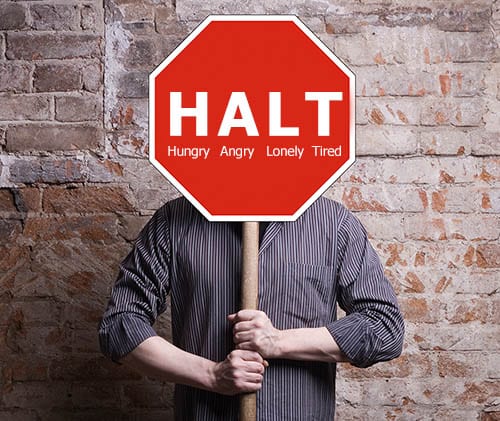For anyone in recovery from drug or alcohol addiction, relapse is a dangerous possibility. There are specific triggers that can contribute to someone relapsing into their substance use disorder.
Addiction is insidious and sometimes subtle in its tactics. Of course, there are hundreds – even thousands – of triggers that could convince someone to use drugs or alcohol again.
Most often, relapse isn’t a sudden decision, but a long and drawn-out process that can be prevented with early intervention. If someone remains aware of the emotions and thoughts they’re experiencing, they can identify an impending relapse and stop it from occurring.
Read on to learn more about common reasons someone may relapse, and advice on how to stay sober despite them.

1. HALT
HALT is a common acronym in 12-step communities used by sober people across the entire country. It stands for “Hungry, Angry, Lonely, Tired” and exists as a tool to help addicts and alcoholics in recovery “check-in” with their emotions when they have alcohol or drug cravings.
Often, when someone is hungry, angry, lonely, or tired, they’re more vulnerable to cravings for their drug of choice. If someone isn’t careful, they may let these emotions go unnoticed and allow them to contribute to a relapse.

If you’re experiencing cravings for your drug of choice, or before you use a drug or take a sip of alcohol, a good rule of thumb is to ask this:
Am I hungry, angry, lonely, or tired? Is there a way I could satisfy these uncomfortable emotions before I think of using my drug of choice?
If you feel hungry, you can try having a healthy meal to see if you feel better. If you’re lonely, you can find ways to combat your social isolation, and so on. By checking in with yourself about these stressful states of beings, you can tend to your true needs instead of jumping right into using drugs or alcohol.
2. Illness And Injury
Illness, sickness, and injury can put immense stress on someone’s body and mind.
Sometimes, when someone is extremely ill, it may remind them of detoxing from a substance and prompt them to use their drug of choice.
Or, perhaps someone is in immense pain from an injury or sickness and is looking for an escape from the pain. In this case, many people might use prescription pills to help ease their discomfort.

Illness and injury can contribute to relapse quickly. It’s crucial that someone in recovery who is ill or injured stays connected with peers and a healthy support system to remain accountable.
Other methods for dealing with pain and illness can help people find relief, like acupuncture, meditation, massage, and mindfulness techniques. Over-the-counter pain medication can relieve the pain of certain injuries, as well.
3. Untreated Mental Health Condition
Many people who leave their mental condition untreated will experience distressing symptoms that could prompt a return to drug or alcohol consumption.
For example, people who suffer from depression or anxiety may drink to relax, feel happier, or stop a moment of panic. Someone with bipolar disorder may use drugs to counteract the highs and lows characteristically associated with their condition.
Without the proper supervision by a medical professional, an untreated mental health issue could lead to someone craving their drug of choice – and eventually relapsing. Be sure that you seek professional medical care if you’re suffering from any abnormal mental and emotional symptoms.
Psychiatrists and therapists can help someone overcome their co-occurring mental health disorders. Learn more about co-occurring mental illnesses that frequently appear alongside addiction on our Co-Occurring Disorders page.
4. Relationship Issues
Relationship issues frequently go hand-in-hand with addiction.
In fact, many people who are addicted to drugs and alcohol are also codependent. Codependency frequently includes a lack of boundaries, low self-esteem, a need for control, and plenty of other symptoms. And it can also make relationships extra tricky.
Many people consider codependency a form of addiction. Therefore, it’s important to remain highly aware of your behavior and emotions with romantic partners, family members, and other relationships. If you feel as though you could be codependent, therapy, and other forms of wellness techniques can help.
However, you don’t need to be a typical codependent person for relationship problems to cause relapse on drugs or alcohol. Relationships are complicated by nature, and sometimes these difficulties can feel overwhelming. Breakups, for example, are a hefty reason many people turn to drugs and alcohol to cope.
Help exists for anyone going through difficulties in their relationships – whether these relationships are romantic, platonic, or with family members.
Addiction Treatment And Its Benefits
Don’t worry. If you or a loved one has recently relapsed on drugs or alcohol, treatment centers and support groups can help. Inpatient addiction treatment centers offer various therapeutic methods to help addicts and alcoholics recover, such as Cognitive Behavioral Therapy.
Treatment centers for addiction, medication-assisted treatment, support groups, and multiple types of therapy can all help someone recover from a recent relapse. Just because someone has a lapse in sobriety does not mean that they can’t stop as soon as possible.
There is inpatient addiction treatment available for people in recovery who relapse on drugs or alcohol. Multiple addiction treatment programs allow. Seek substance abuse treatment if you or a loved one is suffering from drug addiction or co-occurring mental illnesses.
The recovery process is long and ever-evolving. To prevent relapse, sober addicts and alcoholics must remain aware of their addiction relapse triggers.
Addiction recovery is difficult, but it is worth it. Reach out to one of our admissions specialists today or fill out a quick contact form to learn more about how to prevent and treat a relapse on drugs or alcohol.
